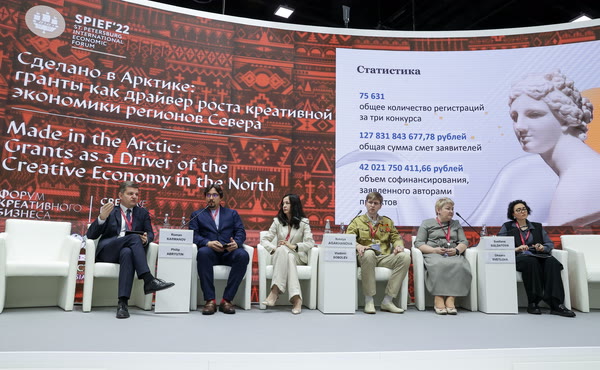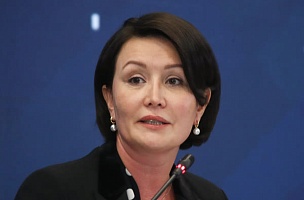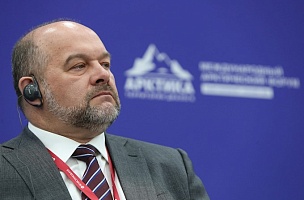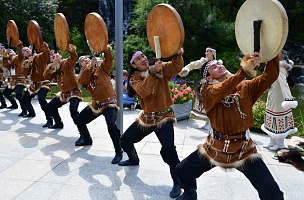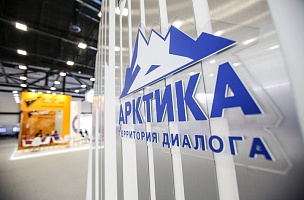Creative projects are helping to achieve sweeping
objectives on an ad-hoc basis
“When we
think of a project, we ask ourselves how it would change the lives of the
people involved. And if something changes, then what will it be important to
do? The worst thing is for a project to fade into the background, for its
existence to be neither here nor there, and for nothing to really change in
terms of life in the region and the creative economy. It is vital to build a
team and community around you which will scale things up around the project
each year,” Philip Abryutin,
Artistic Director, Program Director, Golden Raven International Arctic Film
Festival.
“First
of all, it’s important to ask yourself why you are working on a particular
project. And once you answer that question, you understand what you’re doing
and to what ends, and you can move forward. That’s my first observation. The
second thing is working out what objectives this project encompasses. These
objectives should not be developed on an ad-hoc basis, and should not be wedded
to the business environment, because the business environment can change from
one day to the next. If we put real values at the heart of a project – the kind
that have always worked, and will continue to do so – then it will have legs
and potential,” Natalya Agakhanova,
Director, Krasnoyarsk Foundation for Support and Development of Art named after
Dmitry Hvorostovsky.
Grants
provide genuine assistance, and applicants should not be reticent in asking for
them
“When you work on your own and rely
solely on your own strengths, you won’t be able to bring a large project to
life. Grants help scale things up. They make projects more visible, more
significant,” Svetlana Soldatova, Director, Producer, Northern Character
Producer Center.
“There’s no
need to be afraid – it’s vital to act. Nothing is impossible. And with proper
support and desire, everything is feasible,” Vladimir Sobolev, Head of Student Groups, Headquarters of
the Youth Labor Teams of the Arkhangelsk Region, Russian Student Teams
All-Russian Youth Public Organization.
“In terms of
what we – government bodies – should focus on, I would highlight initiatives
which we sometimes fail to notice. We see things from a strategic point of
view. It’s important to take advantage of all available grants so that current
projects are able to get support and develop further. We should make sure that
each project becomes visible and doesn’t go by unnoticed,” Oksana Svetlova, Minister of
Culture, Arkhangelsk Region.
“I really like the fact that young
people have the chance to develop, and that they aren’t just sitting and
waiting for something. We hear this when we offer them support... Now
they have the chance to genuinely show what their projects are about. We take a
look at these initiatives afterwards and realize that if something has taken
off, then more can be done with it... When I’m in the region, I always implore
people to give something a go, to try, and then afterwards we will absolutely
provide our support as a local authority,” Svetlana Soldatova, Director, Producer, Northern Character
Producer Center.
Cultural
projects should aim to promote prosperity in the regions
“We set out
to address the main thing – improving life for the better by looking at
quantity and quality. Now, there is a lot behind this statement. First of all,
the most important thing was to make sure that people in Chukotka were enjoying
a better quality of life with each passing year, including as a result of our
ambitious cultural project,” Philip
Abryutin, Artistic Director, Program Director, Golden Raven International
Arctic Film Festival.
“Culture
is a driver of economic growth. That’s because unless people enjoy a certain
quality of life, there is no way of achieving progress with any other
initiatives. Basically, people need to feel comfortable with where they live
and enjoy their work. I think that this is the key rationale behind efforts to
develop culture,” Natalya Agakhanova,
Director, Krasnoyarsk Foundation for Support and Development of Art named after
Dmitry Hvorostovsky.
PROBLEMS
It can be
difficult to unleash creativity in today’s world, but easy to forget about the
most important thing
“Once you
move away from the central cities, you don’t see this kind of engagement. When
we started work and the Foundation for Cultural Initiatives was established, we
usually found ourselves urging people to apply for these grants. Now, thanks to
the work of the foundation, we are seeing the emergence of more active people
in the region. There remain inactive people – we need to encourage them, and we
know which districts we should focus our efforts on,” Oksana Svetlova, Minister of Culture, Arkhangelsk
Region.
“Unfortunately,
events can very quickly disappear under the glut of information that
characterizes life today. Unless we make some kind of effort, unless we
highlight the important things, unless we reiterate what is important right
now, we risk simply missing things in this information flow that we shouldn’t.
And this is what we are endeavouring to do with our project,” Natalya Agakhanova, Director,
Krasnoyarsk Foundation for Support and Development of Art named after Dmitry
Hvorostovsky.
It has become difficult to draw young people to the
regions and to employ their talents
“I know that there are regions
where people cannot yet fulfil this objective for themselves. They
cannot find a place for young people – a point where student teams could come
together. Student teams are actually a massive asset for young people in
Russia, and are genuinely engaged in some of the most crucial projects. This
powerful resource should of course be considered when planning projects in your
area,” Roman Karmanov, Chief
Executive Officer, Presidential Fund for Cultural Initiatives.
“Student teams work everywhere –
from the Arctic to the Far East, and Arkhangelsk Region is no exception. There
are a number of unique projects in the High Arctic which we worked on. And as
for Arkhangelsk Region, we have broken some new ground when it comes to getting
projects off the ground. We are home to the first nationwide medical team. I
can also cite an important project involving Novodvinsk Fortress. We had a
large construction project which encompassed all of Russia. Basically, student
teams really do make a big contribution to the development of a region, and they
get young people involved in projects which are important at both a regional,
and national level,” Vladimir
Sobolev, Head of Student Groups, Headquarters of the Youth Labor Teams of the
Arkhangelsk Region, Russian Student Teams All-Russian Youth Public
Organization.
SOLUTIONS
Government
support to foster cultural projects is bearing tangible fruit
Last year we
[the Arctic Open Film Festival – ed.] marked our 10-year anniversary.
Over that time, the event has of course grown in scale. It is an international
festival which brings together all films related to the Arctic. And thanks to
our grant, we were able to improve the jury and focus more on the educational
programme. We were able to bring the community together, and find the kind of
young people we need more of, such as film directors and screenwriters. So, now
we bring everyone together, and are able to teach them. Animation is one
example of the kind of driver that is now in place. We were able to invite
Soyuzmultfilm, which has already attended, and now, as a government body, we
are planning to open a number of schools in cooperation with the animation
studio. We now know that there is a demand for animation in the region, and we
will work to develop this area moving forward,” Oksana Svetlova, Minister of Culture, Arkhangelsk Region.
“If the work
is organized in a strategic way at the regional level, then with each wave it
will be possible to receive funds for further restoration. More events can then
be held, and places that had fallen into disrepair can be further revitalized,”
Roman Karmanov, Chief
Executive Officer, Presidential Fund for Cultural Initiatives.
“In 2019,
the regional government greatly supported our efforts. A bill outlining support
for the film industry in Murmansk Region has been published, and a bill on
rebates has entered into force in the region. In the latter instance,
filmmakers who have a national film certification and who are filming in the
region can benefit from a subsidy covering 30% of the money they have spent in
the region. All this didn’t arise out of the blue – this kind of approach
existed in other countries, and now this experience has taken root in Russia,” Svetlana Soldatova, Director,
Producer, Northern Character Producer Center.
Creative
projects help boost tourism and contribute to regional economies
“Despite the
pandemic and all the problems associated with it, Murmansk Region welcomed
486,000 domestic tourists. This is an indirect result of our work – it’s not
just about films, it’s about developing tourism. And I will cite another
figure. We can say for absolute certain how much money filmmakers bring into
the region due to the rebate programme. In 2019 we allocated RUB 5 million in
rebates against a total of RUB 12 million spent in the region. However, 2021
tells an entirely different story. RUB 10 million was awarded in rebates
against a total of RUB 60 million spent by filmmakers in the region,” Svetlana Soldatova, Director,
Producer, Northern Character Producer Center.
“It is vital
– including for the development of tourism – that we create living history and
contemporary stories. We don’t want there to just be historical monuments
saying that on such‑and-such a date, such-and-such happened. We need something
interesting and relatable in terms of our modern lives. And this all includes
merchandise and the service economy. Our ability to sell and present this will
depend on the level of interest,” Natalya Agakhanova, Director, Krasnoyarsk Foundation for Support and
Development of Art named after Dmitry Hvorostovsky.


